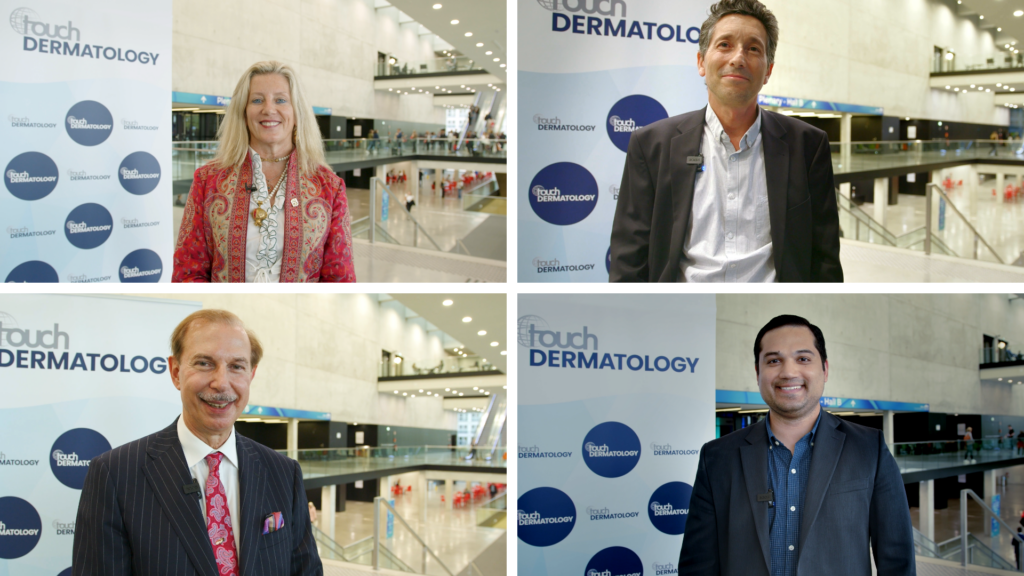Alopecia Areata
An Introduction to Alopecia areata
Alopecia areata (AA) is an inflammatory cause of unpredictable, patchy hair loss that affects up to 2% of the population. Current treatment options for AA involve local steroid injections at the site of alopecia combined with topical retinoids; however, these are of limited efficacy and are associated with significant adverse effects. Recent insights into the pathogenesis of AA have allowed the development of novel treatment options, in particular, Janus kinase (JAK) inhibitors and cytokine-targeted therapy. There have also been reports of hair regrowth following treatment with platelet-rich plasma, stem cell-based therapy approaches and faecal microbiota transplantation.

This year, we are celebrating our inaugural touchDERMATOLOGY Future Leaders to recognize the outstanding talent that has entered our field in recent years. These individuals are set to innovate and transform dermatology in the years to come. Representing a diverse range of expertise from across the globe, these highly accomplished clinicians are among the brightest minds shaping the future of dermatology. We had the pleasure of learning about their unique career journeys, motivations, and the inspirations that have guided their paths. They also shared their perspectives on the most exciting developments in dermatology today, along with their hopes for the future of the field. Congratulations to all our touchDERMATOLOGY Future Leaders, and thank you for sharing your stories, insights and ambitions with us.

With a career that bridges continents and disciplines, we are delighted to feature Dr Yi-Kui Xiang in our touchDERMATOLOGY Future Leaders 2025 initiative. Based in Berlin, Germany, Dr Xiang serves as a clinical scientist at both the Charité Institute of Allergology and the Fraunhofer Institute for Immunology and Allergology, but also maintains a clinical role at the Shanghai Skin Disease Hospital in China. His research interests span from urticaria, IgE-mediated autoimmunity and allergology to alopecia, pruritus, psychodermatology and patient-reported outcomes.

Dr Corinne Maiolo is based in Adelaide, where she treats both adult and paediatric patients, with particular interests in acne, rosacea, eczema, psoriasis, and hair loss. She is the founder of myPRODERM and was awarded the La Roche-Posay Research Grant in 2024 for her work in atopic dermatitis. In this Q&A, Dr Corinne Maiolo reflects on the moments that have shaped her career and shares her hopes for the future of dermatological care.

Physician burnout is at a critical point. In this episode, Nicky speaks with Dr Alfred Atanda about why so many physicians are burning out and what can be done to change the trend. From personal experience to system-wide solutions, Dr Atanda shares valuable insights on improving physician well-being and building a more effective healthcare culture.

The BRAVE-AA-PEDS study focused on 257 adolescents with severe alopecia areata, investigating the efficacy of baricitinib. The trial demonstrated promising results with 42% achieving significant improvement by week 36, and reassuring safety data.

Recent advancements made in understanding the pathology of inflammatory skin conditions have enabled JAK inhibitors, initially developed for haematology over 20 years ago, to be investigated for dermatological use. In this episode, Dr William (Bill) Damsky discusses JAK inhibitors’ journey from proof-of-concept to treating a wide range of skin conditions, their future impact on rare diseases and the debate around safety.

Explore some of the key insights from EADV 2023: Prof. Thierry Passeron illuminates pigmentary disorders breakthroughs, Dr Raj Chovatiya unveils atopic dermatitis innovations, Prof. Leonardo Marini sheds light on aesthetic medicine developments, and Prof. Dedee Murrell reveals treatment progress exciting clinical trials and key discoveries in blistering and autoimmune diseases. Filmed in coverage of the EADV Annual Meeting. This content was developed by Touch Medical Media and is not affiliated with the European Academy of Dermatology & Venereology (EADV) or the congress.

Janus kinase inhibitors (JAKis) have transformed the landscape of dermatological therapy over the last 2 years, with six United States Food and Drug Administration approvals and further clinical trials in progress.1 JAKis have proven highly efficacious in dermatological diseases, by blocking ...

Watch two expert dermatologists discuss AA, focusing on issues related to disease severity, pathophysiology and treatment with JAK inhibitors.
Latest articles videos and clinical updates - straight to your inbox
Log into your Touch Account
Earn and track your CME credits on the go, save articles for later, and follow the latest congress coverage.
Register now for FREE Access
Register for free to hear about the latest expert-led education, peer-reviewed articles, conference highlights, and innovative CME activities.
Sign up with an Email
Or use a Social Account.
This Functionality is for
Members Only
Explore the latest in medical education and stay current in your field. Create a free account to track your learning.

